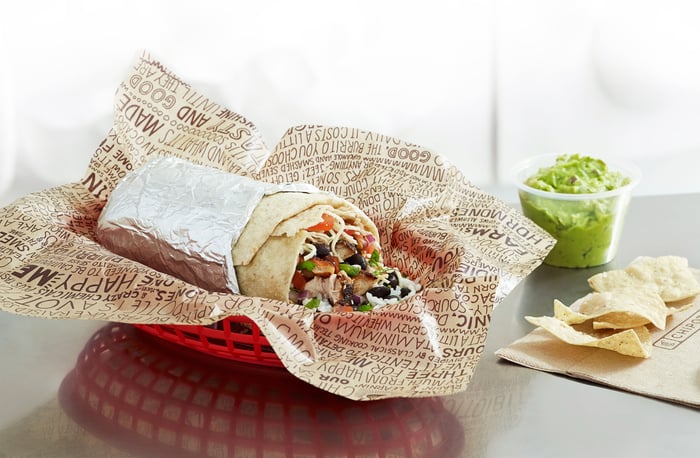It has now been more than 15 years since McDonald's (NYSE: MCD) spun off Chipotle Mexican Grill (NYSE: CMG). The fast-casual chain, with its speedy assembly-line approach and a "food with integrity" mantra that seemed ages ahead of its time, was a savory IPO.
Chipotle went public at $22 in January 2006, and its share price doubled by the end of its first day of trading. That was the first time in more than five years that a U.S.-based debutante had at least doubled on its first day. The chain had fewer than 500 restaurants at the time, but the fast-growing concept was winning fans rapidly with its signature burritos.
The chain has been through a lot since then, but if you were lucky enough to get in on Chipotle's IPO and you held on, a lot has probably happened for you too.

Image source: Chipotle Mexican Grill.
Cool beans
Chipotle has never split its stock nor paid out a dividend, so it's easy to spit out a report card on how it has performed as an investment. The stock is a 63-bagger based on Wednesday's close. If you had shrewdly invested $10,000 at the IPO price in early 2006, your shares would be worth a little more than $640,000 -- $640,100 if you want to be somewhat precise -- today.
Naturally, most of those first investors have long since moved on. Some of the traders who flipped the shares during their first day on the market may have felt good about doubling their money. Holding on to them would've been so much better.
But don't feel bad if you bought and then sold Chipotle at some point along its stratospheric ascent. Even McDonald's sold off its majority stake in Chipotle early in the burrito roller's tenure as a public company. McDonald's has been successful regardless, so there's no point in dunking on the Golden Arches. Still, it has to hurt a bit for Mickey D's shareholders to look at its $150 billion market cap and realize that if it had held onto Chipotle, that figure could have been $40 billion higher.
Chipotle is rolling these days. It has produced comps growth in 11 of its last 12 quarters. Many eateries are still posting negative comps, and the year-over-year comparisons will be cruel until we lap the start of the pandemic shutdowns later this month, but Chipotle had just one negative quarter.
In its latest quarter, revenue rose 12% to $1.61 billion. A 5.7% uptick in comps combined with new restaurant openings over the past year to deliver another period of double-digit-percentage top-line growth. The chain now has 2,768 locations across the country. Adjusted earnings grew even faster.
Chipotle's quick turnaround during the pandemic can largely be credited to its solid execution in digital sales. Between the option to place a mobile order for in-store pickup and the many third-party delivery apps that have partnered with the chain, it has more ways to get a burrito bowl to you now than it did just a couple of years ago. Digital sales today account for nearly half of its total revenue.
The cult-fave chain was a trending concept when it hit the market 182 months ago. It's an undisputed growth stock now. Chipotle has even reached the scale where it was able to spring for a Super Bowl ad last month. The Bucs won that game, but for any investor who was fortunate enough to put $10,000 into Chipotle's 2006 IPO and hold on for the long haul, it's the bucks -- all $640,100 of them -- that are the real MVPs.
10 stocks we like better than Chipotle Mexican Grill
When investing geniuses David and Tom Gardner have a stock tip, it can pay to listen. After all, the newsletter they have run for over a decade, Motley Fool Stock Advisor, has tripled the market.*
David and Tom just revealed what they believe are the ten best stocks for investors to buy right now... and Chipotle Mexican Grill wasn't one of them! That's right -- they think these 10 stocks are even better buys.
*Stock Advisor returns as of February 24, 2021
Rick Munarriz has no position in any of the stocks mentioned. The Motley Fool owns shares of and recommends Chipotle Mexican Grill. The Motley Fool has a disclosure policy.
The views and opinions expressed herein are the views and opinions of the author and do not necessarily reflect those of Nasdaq, Inc.


